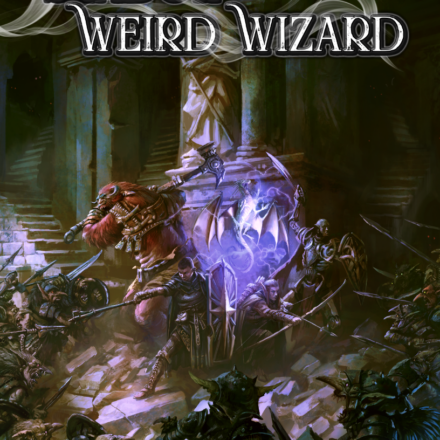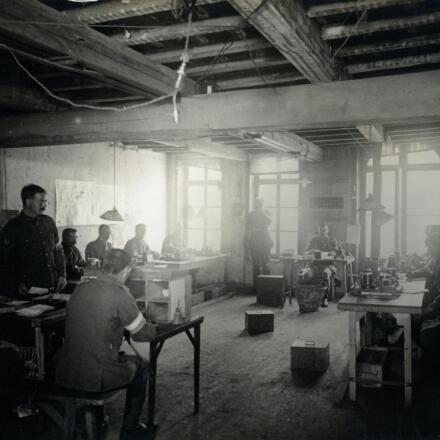 Gamemasters (GM’s) occupy an unusual position. They have great power over the game, adjudicate the rules, and make major decisions. Sometimes they willingly give up that power, rolling dice and letting fortune decide the outcome. GM’s are not really players, but they’re not quite “not players” either.
Gamemasters (GM’s) occupy an unusual position. They have great power over the game, adjudicate the rules, and make major decisions. Sometimes they willingly give up that power, rolling dice and letting fortune decide the outcome. GM’s are not really players, but they’re not quite “not players” either.
In this article, we’ll look at when and why GM’s roll dice. Sometimes it’s easy to know when a GM should roll; but sometimes it’s not as clear. This article is not meant to provide rules for GM’s, merely a deeper look at how we decide when to roll ’em.
NPC’s in Combat
In most games, if a player character (PC) rolls to hit in combat, a GM will roll for a non-player character (NPC). This simulates the stress and randomness of combat on both sides. Similarly, if damage is rolled randomly by players, the same rules apply to NPC’s. Some games streamline the GM’s rolls by using an average damage value.
Similarly, if players get to make a saving throw against a spell or other effect, GM’s generally roll those for NPC’s as well. All these rolls are done to simulate a more level playing field during combat. Fighting is rough business for both sides. Morale is another form of saving throw. Some games have GM’s roll to see if an NPC will remain in combat or flee.
NPC’s in Non-Combat Situations
Similarly GM’s may roll for NPC’s for physical challenges. Perhaps an enemy needs to make a CLIMB check to get to the PC’s. Perhaps a retainer needs to cross the same raging river as the PC’s. Perhaps the PC’s singing partner could lose their voice during the final round and Usher won’t choose them.
NPC’s may also get a “save” in social situations as well. Just because the PC made his CHARISMA check doesn’t mean that the NPC will do everything they ask or divulge all information. Players should get some benefit for rolling well in social situations, but that doesn’t mean that NPC’s can’t have some level of resistance.
To Add Randomness
Some GM’s enjoy introducing a little randomness as they run their sessions. They’ll roll dice and consult tables to determine wandering monsters, environmental hazards, local holidays, and the nearest star system. This approach will certainly stretch your improvisational skills during play. More cautious GM’s (like me) might consider using these tables beforehand. That introduces a little randomness, and can sometimes produce ideas we wouldn’t have considered otherwise.
To Resolve Uncertainty
Roleplaying games allow players to do ANYTHING. Sometimes there won’t be a rule for what they’d like to know or try. Sometimes you don’t want to stop the action to look up an obscure rule. In those cases, consider using the GM’s secret weapon, the humble six-sided die. On a 1-3, things go in the players’ favor. On a 4-6, they don’t. Feel free to adjust the probabilities on a case by case basis if you like. Is there a knife in the room? Does the apothecary sell healing potions? Will Tony dance tonight?
Roll a d6 and see.
To Create Tension
Secret GM rolls can be used to increase the tension at the table. For example, suppose the party is deliberating for a LONG time. Roll behind the screen, look at the dice and ignore the numbers. Then make a concerned face. See if that gets them moving. This technique isn’t for every GM or every situation. You may not want, or need, to bluff your players. Even if you do use it, use it sparingly. Otherwise players may suspect that you fudge many of your rolls.
Concluding Thoughts
The GM doesn’t even have to roll dice. Some games like Dungeon World resolve all actions based on player rolls alone. Other systems could be adapted to eliminate GM rolls, perhaps with a degree of success/failure chart. However, in most games, you’ll need to roll some of the time. Hopefully this article provided some food for thought about when and why we roll.
What reasons can you add to this list? Are there times when you would always roll, or times when you never roll? Let us know below.

















As a GM I use die rolls most of the time in crunchy-mechanics games. I break it down into two fundamental reasons:
1) Dice Keep me Honest
Sure, I could estimate the chance of something happening, like whether or not the villain’s henchman knocks down a PC while the villain is making his escape , consider what makes for a better game, and then tell the players what happens. But I don’t trust myself to stay close enough to the system’s probabilities if I replace them with storytelling. In a crunchy-mechanics game the players have made numerous choices about how to develop, equip, and play their characters based on improving their outcomes in particular situations. To ignore all that leads to player frustration and dissatisfaction.
2) Unexpected is Good (Sometimes)
I always plan encounters with an expected outcome. E.g., the PCs defeat the wandering monster with minimal injuries, the villain narrowly escapes, etc. The likeliness of the outcome is embedded in the system. But systems with random elements like dice occasionally produce some very unlikely outcomes. Like when the PC or NPC who can only fail a save on a 1, rolls a 1.
As a GM there is always a temptation to fudge highly improbable results that would otherwise derail the story. I’ve done that many times. But sometimes I’ve let those awful results stand– and the story has been better for it.
For example, years ago in my LT game the PCs were accompanying a powerful knight to a battle in a distant land. In their first encounter with the enemy, a skirmish with a routine patrol near the border, the NPC hero died. It was one of those “He rolled a 1” situations. …To be fair it was more than just a single die-roll result, but it did involve rolling a 1 on a d20. That’s the part everyone remembers. Anyway. It turned what would otherwise have been a color-by-numbers encounter into high drama for the players. It was also a turning point in their storyline. Instead of riding in to battle like presumed heroes, they had to figure out how to sneak behind enemy lines to find a way to raise their fallen patron. The next several game sessions were taut.
As a GM, it sometime fun to roll some dice. It fun to be surprised by the rolls and putting the game destiny in plastic polyhedrons.
For having tried forward facing combat, I think it sometime speed up the action to have the GM rolls the dice. Informing the player to roll and communicate that roll result is often longer then simply making the roll myself as the GM.
I like to roll in public, in front of the GM screen, even if I don’t say why I’m rolling. The table cheers when I roll bad, and know the hammer is coming down when I roll a crit. This does make it harder to fudge, but I don’t fudge much anyway. The extra excitement is worth it for me.
In a transparent game like 13th Age, I’ll announce what I want to roll “I hope the demon gets a natural 16+ hit!” This has everyone hoping very much I don’t roll a 16+ (or whatever I’ve announced I want).